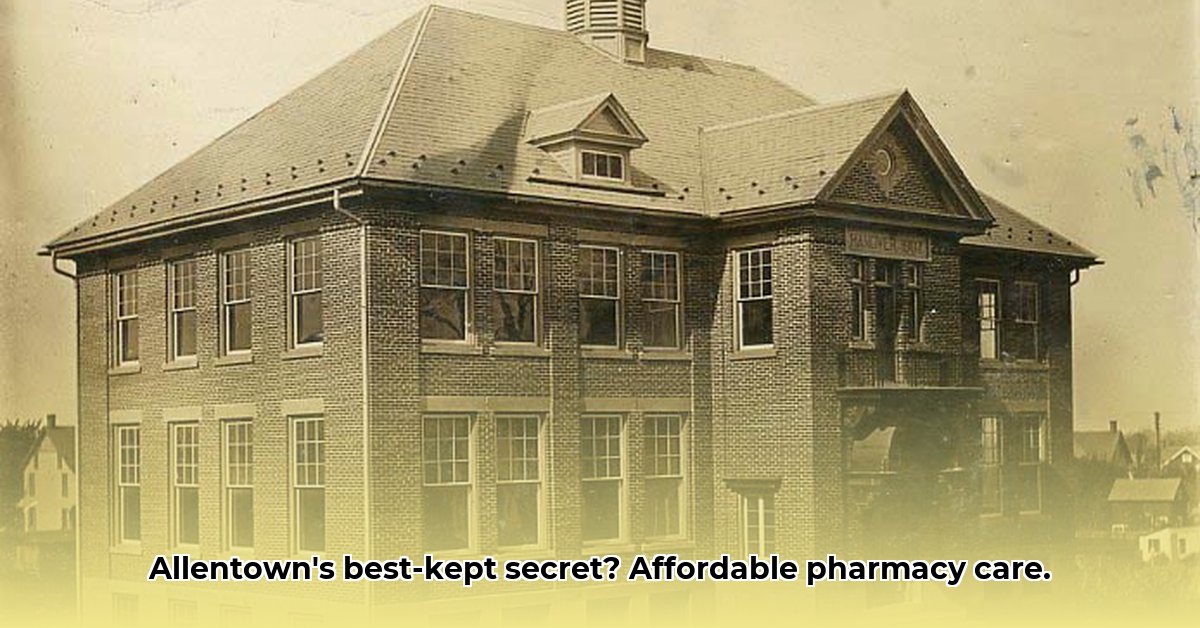
A Case Study in Community-Focused Pharmacy Care
Rittersville Pharmacy, a family-owned business in Allentown, Pennsylvania, exemplifies a commitment to affordable and accessible healthcare. This case study examines Rittersville's model, highlighting its successes, challenges, and future strategic directions. The pharmacy's dedication to its community, coupled with its innovative approach to pricing and patient care, presents a compelling model for other independent pharmacies striving to thrive in a competitive market. How has Rittersville managed to keep prescription costs low while navigating the challenges inherent in today’s healthcare landscape, and what lessons can be learned from their approach?
A Legacy Built on Affordability
Founded on the principle that healthcare should be accessible to all, Rittersville Pharmacy has built a reputation for providing significantly lower prices on generic medications than many competitors in Allentown. This commitment isn't merely a business strategy; it's a core value deeply ingrained in the family’s ownership and operation. The pharmacy’s enduring success demonstrates the viability of a model prioritizing affordability without sacrificing quality of care. This commitment, however, hasn’t come without its share of hurdles.
Navigating the Modern Healthcare Maze: Challenges and Opportunities
Despite its success, Rittersville Pharmacy faces significant challenges in today’s competitive market. A primary concern is its limited online presence. The current website lacks key features now expected by consumers, including a searchable medication database with transparent pricing information. The absence of these features limits the pharmacy's ability to attract new customers familiar with online price comparisons and convenient online ordering. This lack of readily available information also makes it harder to definitively demonstrate Rittersville's claim of consistently offering the most affordable prices in the area.
Another challenge lies in proving the pharmacy’s pricing advantage definitively. While anecdotal evidence points towards lower prices, a robust, data-driven comparison with other local pharmacies is essential to empirically support this claim. This isn't about aggressive marketing; it's about building credible transparency and trust with the community.
Charting a Course for Future Growth: Strategic Actions
Rittersville Pharmacy is actively addressing these challenges through a two-phased strategic plan focusing on enhancing accessibility and expanding services.
Phase 1: Improving Accessibility (Short-Term)
The immediate focus is on creating a modern, user-friendly website. This will involve:
- Developing a searchable medication database: Enabling customers to quickly and easily find the medications they need.
- Implementing transparent pricing: Clearly displaying the price of each medication, removing any ambiguity and fostering trust with potential customers.
- Integrating online ordering capabilities: Allowing customers to order prescriptions for pickup, saving time and enhancing convenience.
Phase 2: Expanding Services (Long-Term)
Long-term goals include:
- Offering medication therapy management (MTM): Providing personalized counseling to patients about their medications, improving medication adherence and overall health outcomes.
- Forging strategic partnerships with local healthcare providers: Collaborating with doctors and clinics to streamline patient care and referrals, strengthening community relationships.
Results and Impact: A Community Lifeline
While quantitative data on the pharmacy's overall impact are currently limited, the qualitative impact on the community is substantial. Rittersville Pharmacy acts as a crucial healthcare access point for many uninsured and underinsured individuals in Allentown, providing affordable access to essential medications, often exceeding basic prescription filling services by offering free delivery. This demonstrates a depth of commitment rarely seen among larger corporations or chain pharmacies.
Analysis and Discussion: Risks and Mitigation
Rittersville's growth strategy involves inherent risks. The pharmacy must carefully manage costs associated with website development and service expansion while ensuring compliance with healthcare regulations. Maintaining a competitive edge requires constant vigilance in the face of competition from larger pharmacy chains. Strategies for mitigating these risks include rigorous financial planning, staying abreast of regulatory changes, and continuously improving customer service and community engagement.
Recommendations for Continued Success
To further solidify its position and maximize its impact, Rittersville should prioritize:
- Investing in a comprehensive and user-friendly website: This will serve as a critical tool in attracting new customers and providing accessible, transparent information.
- Conducting a formal competitive analysis: Objectively assess pricing to substantiate its position as the most affordable option in Allentown.
- Implementing targeted advertising: Highlighting its commitment to affordability and personalized patient care to enhance community awareness.
- Building stronger community ties: Actively engaging with local organizations and participating in community events to build lasting relationships.
Conclusion: A Model for Accessible Healthcare
Rittersville Pharmacy's case study demonstrates how a small, independent pharmacy, through a deep commitment to community needs, pricing transparency, and adaptability, can play a significant role in enhancing healthcare accessibility. Their dedication serves as a valuable model for other healthcare providers and reinforces the critical role independent pharmacies play in the healthcare ecosystem. Further research focusing on competitive price comparisons and patient feedback will be crucial in fully understanding Rittersville's impact and optimizing its future strategies.